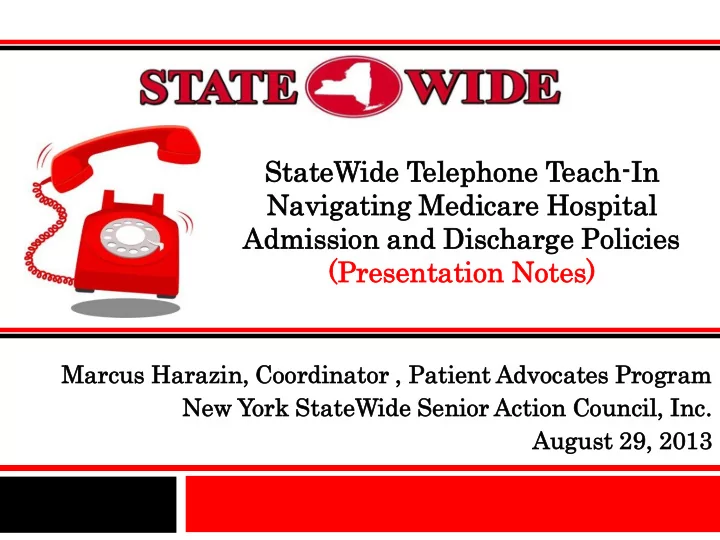

1 State ateWid ide e Tele lepho hone ne Teach ch-In In Navig igat ating ing Medic icare re Hospit ital al Admis issio ion n and nd Dis isch charg rge e Po Poli lici cies (Pr Presen entatio tation n Notes) s) Marcus rcus Harazin, zin, Co Coordinat dinator or , Patient nt Ad Advocates ates Program ram New York rk StateWide ide Senior or Ac Action n Co Counci cil, l, In Inc. August Au st 29, 2013
Speakers 2 Marcus Harazin, Coordinator Patient Advocates Program StateWide Senior Action Council Statewidepatientsrights@gmail.com Andrea Golstein, Vice President Medicare/Federal Health Care Assessment IPRO agoldstein@ipro.org
Welcome and Overview 3 We welcome all participants to the New York StateWide Senior Action Council’s second telephone teach in. The schedule and topics for upcoming monthly calls are posted on our website. • Please mute your phones using the mute function or *6 on your phones. • This is part of a monthly series of calls being held on important topics related to Medicare hospital admission, discharge and readmissions policies. • In July we covered “Patient Observation Status” • For those of you who were unable to participate in that call the presentation summary and answers to questions raised on the call are posted on our website.
Discussion 4 • This session is on Navigating Medicare hospital admission and discharge policies • We are very fortunate to be joined today by Andrea Goldstein from the Island Peer Review Organization (IPRO) which is the Medicare Quality Organization for New York. • Medicare contracts with the IPRO to conduct follow up on hospital quality problems as well as to respond to consumer concerns about hospital discharges. • IPRO also is doing important work on a variety of initiatives to help improve care for Medicare beneficiaries.
Background on the Patient Advocates Program 5 • These monthly Teach-Ins are a component of StateWide’s Patient Advocates Program which is funded through a grant from the Atlantic Philanthropies Foundation. • The program is looking for case examples of situations when Medicare beneficiaries have experiences problems related to admission, discharge or readmission policies. If you have had a problem or know of someone who has we hope that you will share it with us.
Background on the Patient Advocates Program 6 • We are holding public forums across the state to discuss these policies with seniors, hospitals and health care providers. • If you would like us to hold a forum in your area please contact us. • The Patient Advocate Program is also looking for volunteers to help us collect information about cases and educate consumers about Medicare policies. If you or your organization are interested in volunteering, working with us, or receiving more information please contact us.
StateWide’s Hospital Survey and Patient Advocates Pledge 7 • As part of the project StateWide Chapters are working to survey local hospitals to determine their policies and asking hospitals to take “The Patient Advocates Pledge” to help inform Medicare patients about their admission status in a clear and timely manner. • The Survey and Pledge will be posted on our Web site and they are the topics of discussion for the Teach-In on September 26.
Hospital and Admission and Discharge Policies 8 • In 2011 32.8 million Medicare beneficiaries used some sort of health care paid in part by Medicare. Hospitals comprise over one half of all Medicare expenditures with almost 24% of beneficiates receiving in patient care and 75% receiving hospital out patient care. Some of these out patient cases involved hospitals stays under observation status. • Trips to the hospital are often made when Medicare beneficiaries are very sick and may be limited in terms of advocating for their rights and needs. • Understanding how to navigate hospital admission and discharge policies is of extreme importance to help them avoid unnecessary problems and costs.
Closing Comments 9 • The Teach-In today is designed to help consumers and professionals understand basic admission and discharge policies. • We will revisit this topic in greater detail from a hospital discharge planners perspective on our Nov. 21 Teach In so if you may want to mark your calendar for that session. • Today we are fortunate to have Andrea Goldstein from IPRO as our speaker. • Please remember to keep your phones on mute. We will take questions at the end of the session. • We will also post material from the presentations on our Web site.
Closing Comments 10 Upcoming Teach-In Calendar • Sept 26: StateWide Survey on local hospital policies and asking hospitals to take the Patient Advocates Pledge. • Oct. 31: Status of State and Federal legislative solutions. • Nov. 21: How to talk to admissions and discharge staff to protect patient’s rights and obtain good care. • Dec. 19: Preventing Readmissions: Programs that help Medicare patients avoid readmission. • Jan. 30: Preparing for the Future: What you need to do if you are planning to check into a hospital for care.
Recommend
More recommend